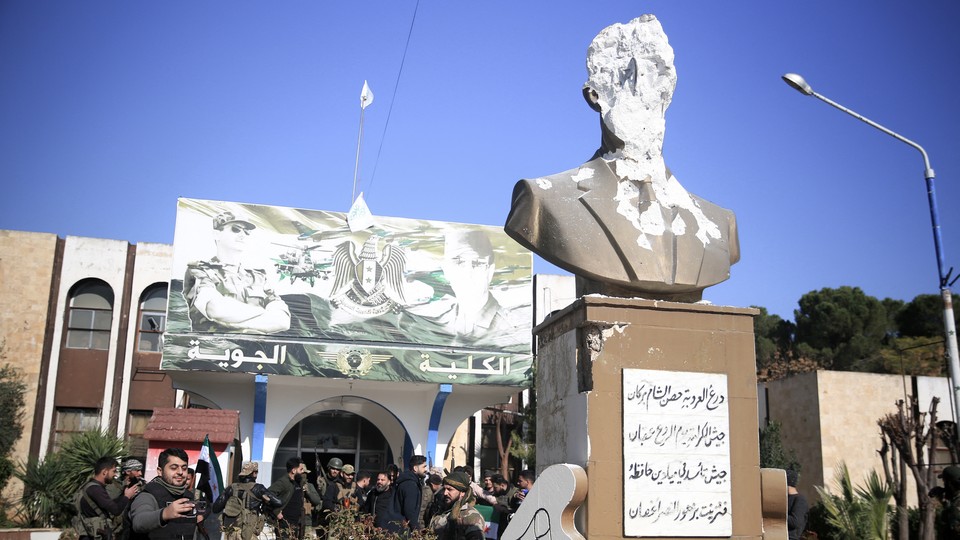The Sudden Collapse of Bashar al-Assad
5 min read
As Hemingway once wrote of bankruptcy, the collapse of autocratic regimes tends to happen gradually and then suddenly—slowly, and then all at once. This is not just a literary metaphor. A tyrant’s followers remain loyal to him only as long as he can offer them protection from their compatriots’ wrath. In Syria, doubts about President Bashar al-Assad surely grew slowly, after his Russian backers began to transfer men and equipment to Ukraine, starting in 2022. The more recent Israeli attack on Hezbollah’s leadership hampered Iran, Assad’s other ally, from helping him as well.
Then, after a well-organized, highly motivated set of armed opponents took the city of Aleppo on November 29, many of the regime’s defenders abruptly stopped fighting. Assad vanished. The scenes that followed today in Damascus—the toppling of statues, the taking selfies of the dictator’s palace—are the same ones that will unfold in Caracas, Tehran, or Moscow on the day the soldiers of those regimes lose their faith in the leadership, and the public loses their fear of those soldiers too.
The similarities among these places are real, because Russia, Iran, Venezuela, North Korea, and, until now, Syria all belong to an informal network of autocracies. Russian troops and mercenaries have spent the past decade fighting in Ukraine, the Middle East, and Africa. Russian political and information operations actively seek to undermine, dominate, or overthrow democratic governments in Moldova, Georgia, and most recently Romania. Starting in 2015, Russian troops propped up Assad in partnership with Iran and Iran’s proxy Hezbollah. In Ukraine, Russia’s war is made possible by drones from Iran, soldiers and ammunition from North Korea, and covert help from China. Russia, Iran, Cuba, and China collaborate to keep in power a regime in Venezuela that has catastrophically failed its people too.
Many of these are military conflicts, but Russian President Vladimir Putin also believes that he is fighting a war of ideas, and he has persuaded others to follow him. In both Syria and occupied Ukraine, Russia has deliberately backed or created regimes that have not merely sought to repress opponents, but also go out of their way to demonstrate flagrant disregard for human rights and the rule of law, ideas that he claims belong to the past. When Putin talks about a new world order or a “multipolar world,” as he did again last month, this is what he means: He wants to build a world in which his cruelty cannot be limited, in which he and his fellow dictators enjoy impunity, and in which no universal values exist, not even as aspirations.
The results are stark. Since 2011, the Syrian Network for Human Rights has documented more than 112,000 disappearances—men, women, and children arbitrarily arrested and imprisoned with no formal or legal justification. The regime has tortured tens of thousands of people in brutal prisons, keeping them in the dark, forbidding them any contact with the outside world. Infamously, Assad used poison gas against his own people, and then lied about it. Joint Russian and Syrian-government air strikes deliberately targeted hospitals and practiced “double tap” strikes, bombing a civilian target and then hitting the same location soon afterward to kill rescue workers.
The Russian war against Ukraine has been equally cruel and equally lawless, in many instances copying tactics used in Syria. In occupied Ukraine, thousands of mayors, local leaders, teachers, and cultural figures have also disappeared into invisible custody. The former mayor of Kherson, abducted in June 2022, is reportedly being held in an illegal prison in Crimea; the mayor of Dniproprudne recently died in custody. In the rest of Ukraine, Russia deliberately targets hospitals and other civilian infrastructure, just as Russian and Syrian government planes did in Syria. Double-tap strikes are common in Ukraine too.
This kind of cold, deliberate, well-planned cruelty has a logic to it: Brutality is meant to inspire hopelessness. Ludicrous lies and cynical propaganda campaigns are meant to create apathy and nihilism. Random arrests have driven millions of Syrians, Ukrainians, and Venezuelans abroad, creating large, destabilizing waves of refugees and leaving those who remain in despair. The despair, again, is part of the plan. These regimes want to rob people of any ability to plan for a different future, to convince people that their dictatorships are eternal. “Our leader forever” was the Assad dynasty’s slogan.
But all such “eternal” regimes have one fatal flaw: Soldiers and police officers are members of the public too. They have relatives who suffer, cousins and friends who experience political repression and the effects of economic collapse. They, too, have doubts, and they, too, can become insecure. In Syria, we have just seen the result.
I don’t know whether today’s events will bring peace and stability to Syria, let alone freedom and democracy. A group calling itself the National Transitional Government has reportedly issued a statement asking Syrians to “unite and stand together,” to “rebuild the state and its institutions,” and to begin a “comprehensive national reconciliation,” including the return of all refugees. The leaders of the rebel armies include Islamic extremists; in an interview with CNN, Abu Mohammed al-Jolani, the leader of the largest group, Hayat Tahrir al-Sham, described his past affiliation with al-Qaeda as a kind of youthful mistake. This might be tactical language, or propaganda, or unimportant. As I am writing, Syrians in Damascus are looting the presidential palace.
Nevertheless, the end of the Assad regime creates something new, and not only in Syria. There is nothing worse than hopelessness, nothing more soul-destroying than pessimism, grief, and despair. The fall of a Russian- and Iranian-backed regime offers, suddenly, the possibility of change. The future might be different. And that possibility will inspire hope all around the world.



